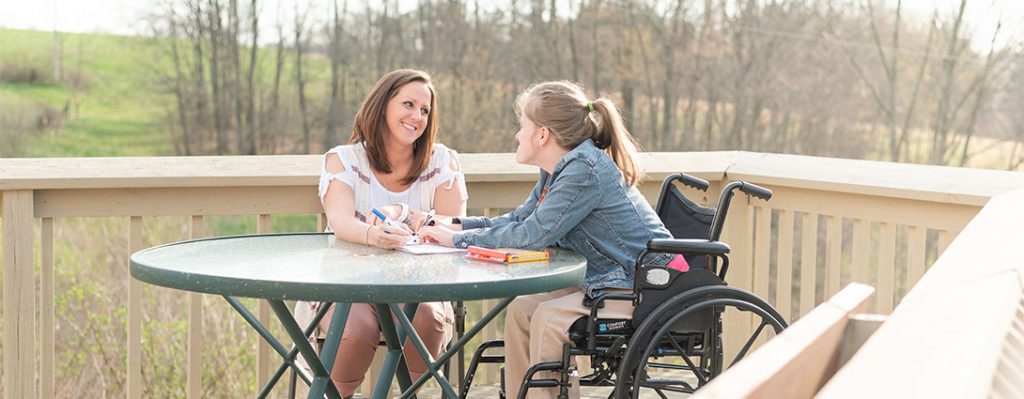Caregiver burnout, guilt, overwhelming anxiety and depression. How do we deal and cope with the guilt over realizing we just can’t do it any longer? When placing someone you love into a long term facility…how do you handle your emotions?
When we jump into the role of caregiver, we often are thinking about the immediate need and we miss the reality of how long the role can go on. The role of caregiver can last decades and can become arduous and consuming.
Placing someone you love in the hands of others is extremely difficult and even more difficult if that person has a disability. The following information is informative, comforting, and a true blessing because the content allows us to feel what we need to feel and yet, focuses on what’s best for everyone.
Take time for yourself…
Thoughts of wishing you no longer had to care for someone or that you will never get your life back are normal, but also signal caregiver burnout and compassion fatigue. Being responsible for someone else’s care day after day can become overwhelming to the point of debilitating depression. That’s when it’s time to following this great advice.
- See a doctor for yourself. Get a thorough physical and ask your doctor if you may need treatment for depression. Unchecked caregiver stress often contributes to burnout, depression, anxiety and other mental health issues. Tell your doctor about your daily routine, your moods and your mindset lately. He or she may suggest medication and/or counseling for depression and stress. If you don’t address these issues, at the very least, go to your annual preventative appointments. Caregiving takes a toll on your physical health and it’s important to listen to and take care of your body.
- Don’t consider time off a luxury. Respite care is a necessity. It is crucial for your mental and physical health. Do whatever you can to find any type of break as frequently as possible. You need time to disconnect from providing care and recuperate. Hire in-home care, take your loved one to adult day care, or ask a family member, friend or neighbor to watch them for even 30 minutes while you decompress. Find ways to make time for yourself while also seeing that your loved one is well cared for.
- Find a sanctuary where you can recharge. If you like being outside, find a park where you can walk, sit on a bench, read or meditate. If you prefer the indoors, visit the local library, tour a museum, go see a movie or attend a church service. Do things that bring you peace and happiness. Ideally, you will have a place in your home as well where you can enjoy some solitude.
- Find productive ways to release stress. Exercise is known to help both mental and physical health. Remember, although gyms and yoga classes may count as “away time,” they aren’t necessarily alone time. If you need to blow off some steam by yourself, try going for a long walk, bike ride or swim. Remember that artistic endeavors can be useful outlets as well. Whether you’re journaling, cooking, drawing, painting, or playing or listening to music, pursuing hobbies you love can have powerful restorative effects.
- Join a support group. Support groups of all kinds can be found both in person and online. These group settings are excellent sources of friendship, validation, advice and empowerment. They’re especially helpful to caregivers who feel isolated and “stuck” on their journey. Remember, if you don’t have time to go somewhere, there are many support groups online. – Carol Bradley Bursack
The one thing everyone wants is to know that their loved one is safe and cared for. If the reality is that they simply can’t care for themselves, we must make sure they are safe and cared for by others. The choice is not an easy one, but it’s a choice made out of love. When we realize we can no longer handle every aspect of the care, it’s time to seek help.
Sometimes that help comes in the form of outside assistance in the person’s home and sometimes it means placement into a living environment that has the capability of ensuring safety and care. We can’t allow guilt to drive the decision. We have to make sound decisions based off the reality of the situation.
If the person you love has a disability that makes it impossible to live at home, the decision of placement can be heartbreaking, but looking past the present emotion into the future of the situation allows us to make good, sound decisions. Will we be able to care for the loved one for the rest of their lives, even though we are aging ourselves? Will we be able to maintain good mental and physical health along the journey? How can we help others if we are not healthy and able to help ourselves? These are all questions faced by those in the position of caregiver.
When you are a loved one from a distance, you can still be a strong member of a loved one’s support network. By making phone calls, connecting through chats or video calls, writing letters and praying for them…you stay a part of their social circle and emotional team.
“Recognize that feelings of inadequacy and guilt are normal. Allow yourself to acknowledge these emotions, so you can process them and let them go. Know what your strengths as long distance support but also accept that there are real limits to what you can do from afar.” – Dr. Alexis Abramson
Whether near or far, remember to make decisions out of love…when we consult the heart we can’t go wrong.
The power of pray is an amazing thing. Look to God when it all becomes more than you can handle. Sometimes the answers are just a prayer a way.


